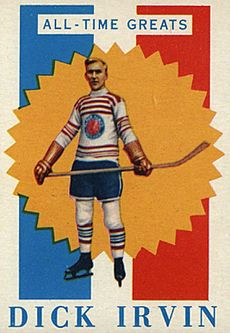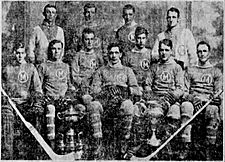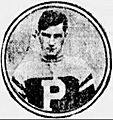Dick Irvin facts for kids
Quick facts for kids Dick Irvin |
|||
|---|---|---|---|
| Hockey Hall of Fame, 1958 | |||
 |
|||
| Born | July 19, 1892 Hamilton, Ontario, Canada |
||
| Died | May 16, 1957 (aged 64) Montreal, Quebec, Canada |
||
| Height | 5 ft 9 in (175 cm) | ||
| Weight | 162 lb (73 kg; 11 st 8 lb) | ||
| Position | Centre | ||
| Shot | Left | ||
| Played for | Portland Rosebuds Regina Capitals Chicago Black Hawks |
||
| Playing career | 1916–1929 | ||
Dick Irvin was a famous Canadian ice hockey player and coach. He was born on July 19, 1892, and passed away on May 16, 1957. Dick played for professional teams in different leagues, including the National Hockey League (NHL), from 1916 to 1928. He was known as one of the best players of his time. He had a powerful slap shot and played tough, but also fairly.
After his playing days, Irvin became a very successful coach in the NHL. He coached the Chicago Black Hawks, Toronto Maple Leafs, and Montreal Canadiens. As a coach, he won one Stanley Cup with Toronto and three more with Montreal. He ended his coaching career with over 600 wins. Dick Irvin was so important to hockey that he was added to the Hockey Hall of Fame in 1958. He also served in the military during the First World War.
Contents
Growing Up: Dick Irvin's Early Life
Dick Irvin was born in Hamilton, Ontario. He was one of ten children in his family. When he was eight years old, his family moved to Winnipeg, Manitoba.
Dick started playing hockey when he was very young. His older brother, Alex, also played. Their father would take them and other boys to games using a horse and sleigh. The family even made an ice rink in their driveway for the boys to play on. Dick also practiced his shooting skills in the attic of their home. He would shoot a puck at an old doorknob.
Irvin first played senior hockey at just 12 years old. He played for the Winnipeg Strathconas. Later, he played for the Winnipeg Monarchs. In 1915, he helped the Monarchs win the 1915 Allan Cup. This was a very important championship for amateur hockey teams.
Besides hockey, Dick Irvin was also a talented baseball player. He played on a team with his brothers. He was also good at curling.
Dick Irvin's Hockey Career: Player and Coach
Dick Irvin started his professional hockey career in 1916. He joined the Portland Rosebuds in the Pacific Coast Hockey Association. In his first season, he scored 35 goals, which was a great start.
In 1917, Irvin joined the Canadian military during World War I. He served overseas in England and France. After the war, he returned to Canada in 1919.
He played amateur hockey for a few years. Then, in 1921, he returned to professional hockey with the Regina Capitals. In 1926, when he was 34, he joined the National Hockey League (NHL). He signed with the new Chicago Black Hawks team. Irvin became the team's first captain. He had a great first season, finishing second in the league in scoring.
His second season in the NHL was difficult. He suffered a serious head injury. This injury eventually led him to retire from playing after the 1928–29 season. During his last two seasons as a player, he also started helping out with coaching duties.
Coaching the Black Hawks and Maple Leafs
In 1930, Dick Irvin became the head coach of the Chicago Black Hawks. In his first year, he led the team to the Stanley Cup Final. However, they lost the championship. The Black Hawks let him go in September 1931.
A few months later, the Toronto Maple Leafs hired Irvin. They were struggling at the start of their season. In his first season coaching the Leafs, he led them to win the Stanley Cup. This was a huge success for the team and for Irvin. He led the Leafs to the finals six more times, but they didn't win another Cup during his time there.
By 1940, the Maple Leafs' manager, Conn Smythe, decided it was time for a change. He felt Irvin had done all he could for the team. Smythe also knew that the Montreal Canadiens were having a very tough time. They had just finished with their worst season ever. Smythe suggested that the Canadiens hire Irvin. This helped both teams.
Success with the Montreal Canadiens
Dick Irvin quickly turned the Montreal Canadiens around. In his first season, he got them back into the playoffs. By his fourth season, he led them all the way to the Stanley Cup. This was the first of six times he would lead them to the finals, winning three more Stanley Cups with Montreal.
He had amazing star players like Elmer Lach, Doug Harvey, goalie Bill Durnan, and a young Maurice Richard. Under Irvin, the Canadiens started to become a very strong team, almost like a dynasty. He was known for letting his players play a tough style of hockey. After a while, he faced some pressure and decided to step down as coach.
Return to Chicago and Retirement
Irvin returned to coach the Chicago Black Hawks for the 1955–56 season. The team had not been doing well. He tried to improve their performance, but they finished in last place again.
Dick Irvin was supposed to coach the Black Hawks again in 1956–57. But he became very ill with bone cancer. He had to retire before the season began. He passed away a few months later in Montreal at the age of 64.
A year after his death, Dick Irvin was elected into the Hockey Hall of Fame. His coaching career included four Stanley Cups and 692 regular season wins. He is one of the most successful coaches in hockey history.
Dick Irvin's Playing Style
When Dick Irvin joined the Portland Rosebuds in 1916, the league president, Frank Patrick, was very excited. He called Irvin "the greatest forward who ever came into the Pacific Coast League." Patrick believed Irvin would become "one of the best players in the country." He said Irvin was a "natural-born goal getter" who could score from almost any angle.
At first, Irvin didn't play much. He even thought about leaving the league. But once he got a chance to play, he proved himself. By the end of the season, he had met Frank Patrick's high expectations. He finished fourth in goals and fifth in total points in the league.
Irvin was known for playing cleanly and living a healthy life. He believed good health was important for his game. He was also known for his tricky moves and his dangerous shooting ability on the ice.
Personal Life
Dick Irvin lived in Regina, Saskatchewan, for most of his life. In 1954, he bought a home in Mount Royal, Quebec. He was married to Bertha Helen Bain. They had two children: a daughter named Fay and a son named James Dickinson Irvin III, who is known as Dick Irvin, Jr. His son became a well-known Canadian television sports announcer.
Dick Irvin was also interested in raising pigeons. He passed away at his home in Mount Royal after a long illness. He was buried in Mount Pleasant Cemetery, Toronto.
In 2005, a movie about hockey legend Maurice Richard was made. In the film, called The Rocket, Canadian actor Stephen McHattie played Dick Irvin.
Tribute
After Dick Irvin's death, the NHL president, Clarence Campbell, shared a statement. He said that "Everyone in the hockey world mourns." He added that they had lost "one of the greatest figures the game has ever known."
Career Statistics
Regular Season and Playoffs
| Regular season | Playoffs | |||||||||||||
|---|---|---|---|---|---|---|---|---|---|---|---|---|---|---|
| Season | Team | League | GP | G | A | Pts | PIM | GP | G | A | Pts | PIM | ||
| 1911–12 | Winnipeg Monarchs | MHL | 5 | 16 | 0 | 16 | 0 | 1 | 5 | 0 | 5 | 0 | ||
| 1912–13 | Winnipeg Strathconas | MHL | 7 | 32 | 0 | 32 | 12 | 1 | 0 | 0 | 0 | 0 | ||
| 1912–13 | Winnipeg Monarchs | MHL | 2 | 5 | 0 | 5 | — | — | — | — | — | — | ||
| 1913–14 | Winnipeg Strathconas | MHL | 3 | 11 | 0 | 11 | — | — | — | — | — | — | ||
| 1913–14 | Winnipeg Monarchs | MHL | 7 | 23 | 1 | 24 | — | — | — | — | — | — | ||
| 1914–15 | Winnipeg Monarchs | MHL | 6 | 23 | 3 | 26 | 30 | 2 | 10 | 0 | 10 | 2 | ||
| 1914–15 | Winnipeg Monarchs | Al-Cup | — | — | — | — | — | 6 | 17 | 3 | 20 | 20 | ||
| 1915–16 | Winnipeg Monarchs | MHL | 8 | 17 | 4 | 21 | 38 | 2 | 7 | 1 | 8 | 2 | ||
| 1916–17 | Portland Rosebuds | PCHA | 23 | 35 | 10 | 45 | 24 | — | — | — | — | — | ||
| 1917–18 | Winnipeg Ypres | MHL | 9 | 29 | 8 | 37 | 26 | — | — | — | — | — | ||
| 1919–20 | Regina Victorias | SSHL | 12 | 32 | 4 | 36 | 22 | 2 | 1 | 0 | 1 | 4 | ||
| 1920–21 | Regina Victorias | SSHL | 11 | 19 | 5 | 24 | 12 | 4 | 8 | 0 | 8 | 4 | ||
| 1921–22 | Regina Capitals | WCHL | 20 | 21 | 7 | 28 | 17 | 4 | 3 | 0 | 3 | 2 | ||
| 1921–22 | Regina Capitals | West-P | — | — | — | — | — | 2 | 1 | 0 | 1 | 0 | ||
| 1922–23 | Regina Capitals | WCHL | 25 | 9 | 4 | 13 | 12 | 2 | 1 | 0 | 1 | 0 | ||
| 1923–24 | Regina Capitals | WCHL | 29 | 15 | 8 | 23 | 33 | 2 | 0 | 0 | 0 | 4 | ||
| 1924–25 | Regina Capitals | WCHL | 28 | 13 | 5 | 18 | 38 | — | — | — | — | — | ||
| 1925–26 | Portland Rosebuds | WHL | 30 | 31 | 5 | 36 | 29 | — | — | — | — | — | ||
| 1926–27 | Chicago Black Hawks | NHL | 43 | 18 | 18 | 36 | 34 | 2 | 2 | 0 | 2 | 4 | ||
| 1927–28 | Chicago Black Hawks | NHL | 12 | 5 | 4 | 9 | 14 | — | — | — | — | — | ||
| 1928–29 | Chicago Black Hawks | NHL | 39 | 6 | 1 | 7 | 30 | — | — | — | — | — | ||
| WCHL/WHL totals | 102 | 58 | 24 | 82 | 100 | 8 | 4 | 0 | 4 | 6 | ||||
| NHL totals | 94 | 29 | 23 | 52 | 78 | 2 | 2 | 0 | 2 | 4 | ||||
Coaching Record
| Team | Year | Regular Season | Post Season | |||||
|---|---|---|---|---|---|---|---|---|
| G | W | L | T | Pts | Finish | Result | ||
| Chicago Black Hawks | 1928–29 | 12 | 2 | 6 | 4 | 22 | 5th in American | Did not qualify |
| Chicago Black Hawks | 1930–31 | 44 | 24 | 17 | 3 | 51 | 2nd in American | Lost in Stanley Cup Finals |
| Toronto Maple Leafs | 1931–32 | 43 | 23 | 15 | 5 | 53 | 2nd in Canadian | Won Stanley Cup |
| Toronto Maple Leafs | 1932–33 | 48 | 24 | 18 | 6 | 54 | 1st in Canadian | Lost in Stanley Cup Finals |
| Toronto Maple Leafs | 1933–34 | 48 | 26 | 13 | 9 | 61 | 1st in Canadian | Lost in semi-finals |
| Toronto Maple Leafs | 1934–35 | 48 | 30 | 14 | 4 | 64 | 1st in Canadian | Lost in Stanley Cup Finals |
| Toronto Maple Leafs | 1935–36 | 48 | 23 | 19 | 6 | 52 | 2nd in Canadian | Lost in Stanley Cup Finals |
| Toronto Maple Leafs | 1936–37 | 48 | 22 | 21 | 5 | 49 | 3rd in Canadian | Lost in quarter-finals |
| Toronto Maple Leafs | 1937–38 | 48 | 24 | 15 | 9 | 57 | 1st in Canadian | Lost in Stanley Cup Finals |
| Toronto Maple Leafs | 1938–39 | 48 | 19 | 20 | 9 | 47 | 3rd in NHL | Lost in Stanley Cup Finals |
| Toronto Maple Leafs | 1939–40 | 48 | 25 | 17 | 6 | 56 | 3rd in NHL | Lost in Stanley Cup Finals |
| Montreal Canadiens | 1940–41 | 48 | 16 | 26 | 6 | 38 | 6th in NHL | Lost in quarter-finals |
| Montreal Canadiens | 1941–42 | 48 | 18 | 27 | 3 | 39 | 6th in NHL | Lost in quarter-finals |
| Montreal Canadiens | 1942–43 | 50 | 19 | 19 | 12 | 50 | 4th in NHL | Lost in semi-finals |
| Montreal Canadiens | 1943–44 | 50 | 38 | 5 | 7 | 83 | 1st in NHL | Won Stanley Cup |
| Montreal Canadiens | 1944–45 | 50 | 38 | 8 | 4 | 80 | 1st in NH | Lost in semi-finals |
| Montreal Canadiens | 1945–46 | 50 | 28 | 17 | 5 | 61 | 1st in NHL | Won Stanley Cup |
| Montreal Canadiens | 1946–47 | 60 | 34 | 16 | 10 | 78 | 1st in NHL | Lost in Stanley Cup Finals |
| Montreal Canadiens | 1947–48 | 60 | 20 | 29 | 11 | 51 | 5th in NHL | Did not qualify |
| Montreal Canadiens | 1948–49 | 60 | 28 | 23 | 9 | 65 | 3rd in NHL | Lost in semi-finals |
| Montreal Canadiens | 1949–50 | 70 | 29 | 22 | 19 | 77 | 2nd in NHL | Lost in semi-finals |
| Montreal Canadiens | 1950–51 | 70 | 25 | 30 | 15 | 65 | 3rd in NHL | Lost in Stanley Cup Finals |
| Montreal Canadiens | 1951–52 | 70 | 34 | 26 | 10 | 78 | 2nd in NHL | Lost in Stanley Cup Finals |
| Montreal Canadiens | 1952–53 | 70 | 28 | 23 | 19 | 75 | 2nd in NHL | Won Stanley Cup |
| Montreal Canadiens | 1953–54 | 70 | 35 | 24 | 11 | 81 | 2nd in NHL | Lost in Stanley Cup Finals |
| Montreal Canadiens | 1954–55 | 70 | 41 | 18 | 11 | 93 | 2nd in NHL | Lost in Stanley Cup Finals |
| Chicago Black Hawks | 1955–56 | 70 | 19 | 39 | 12 | 50 | 6th in NHL | Did not qualify |
| Total | 1449 | 692 | 527 | 230 | 1612 | — | 24 playoff appearances, 4 Stanley Cup Wins | |
Awards and Achievements
- Allan Cup Championship (1915)
- Stanley Cup Championships as a coach (1932 – Toronto, 1944, 1946, and 1953 – Montreal)
- Lost in the finals a record 12 times as a coach (1931 – Chicago, 1933-35-36-38-39-40 – Toronto, 1947-51-52-54-55 – Montreal)
- NHL First All-Star Team Coach (1944, 1945, 1946)
- NHL Second All-Star Team Coach (1931, 1932, 1933, 1934, 1935, 1941)
- Inducted into the Manitoba Sports Hall of Fame and Museum in 1983
- Selected to Manitoba's All-Century First All-Star Team and named Coach of the Century
- Honoured Member of the Manitoba Hockey Hall of Fame
Images for kids
See also
 In Spanish: Dick Irvin para niños
In Spanish: Dick Irvin para niños
 | John T. Biggers |
 | Thomas Blackshear |
 | Mark Bradford |
 | Beverly Buchanan |



